国际贸易实务
- 格式:doc
- 大小:112.00 KB
- 文档页数:17
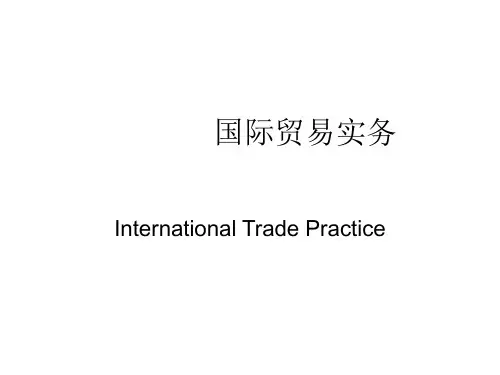

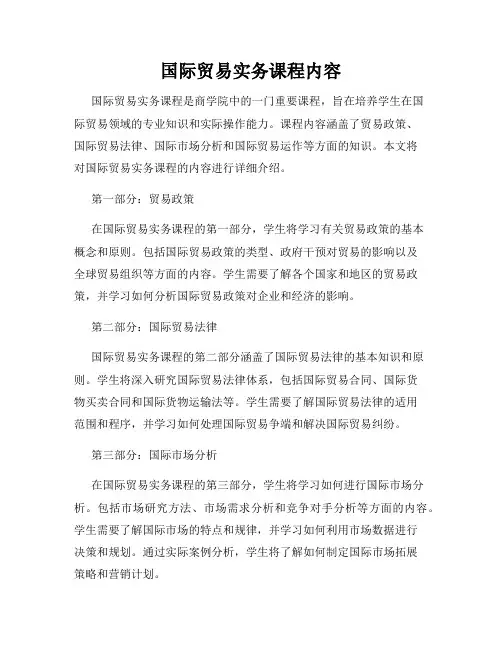
国际贸易实务课程内容国际贸易实务课程是商学院中的一门重要课程,旨在培养学生在国际贸易领域的专业知识和实际操作能力。
课程内容涵盖了贸易政策、国际贸易法律、国际市场分析和国际贸易运作等方面的知识。
本文将对国际贸易实务课程的内容进行详细介绍。
第一部分:贸易政策在国际贸易实务课程的第一部分,学生将学习有关贸易政策的基本概念和原则。
包括国际贸易政策的类型、政府干预对贸易的影响以及全球贸易组织等方面的内容。
学生需要了解各个国家和地区的贸易政策,并学习如何分析国际贸易政策对企业和经济的影响。
第二部分:国际贸易法律国际贸易实务课程的第二部分涵盖了国际贸易法律的基本知识和原则。
学生将深入研究国际贸易法律体系,包括国际贸易合同、国际货物买卖合同和国际货物运输法等。
学生需要了解国际贸易法律的适用范围和程序,并学习如何处理国际贸易争端和解决国际贸易纠纷。
第三部分:国际市场分析在国际贸易实务课程的第三部分,学生将学习如何进行国际市场分析。
包括市场研究方法、市场需求分析和竞争对手分析等方面的内容。
学生需要了解国际市场的特点和规律,并学习如何利用市场数据进行决策和规划。
通过实际案例分析,学生将了解如何制定国际市场拓展策略和营销计划。
第四部分:国际贸易运作国际贸易实务课程的第四部分关注国际贸易的具体操作过程。
学生将学习国际贸易的相关流程和操作要点,包括国际采购、国际运输和关税报关等。
学生需要了解国际贸易的各个环节和流程,并学习如何处理进出口文件和支付方式等事务。
通过实操练习和案例分析,学生将培养国际贸易操作的技能和经验。
总结国际贸易实务课程是培养学生国际贸易专业知识和实际操作能力的重要课程。
该课程的内容涵盖了贸易政策、国际贸易法律、国际市场分析和国际贸易运作等方面的知识。
通过系统学习和实践训练,学生将具备在国际贸易领域从事相关工作的能力和素养。
国际贸易实务课程的学习将有助于培养学生的跨文化沟通能力、国际商务谈判能力以及全球视野和战略思维能力。
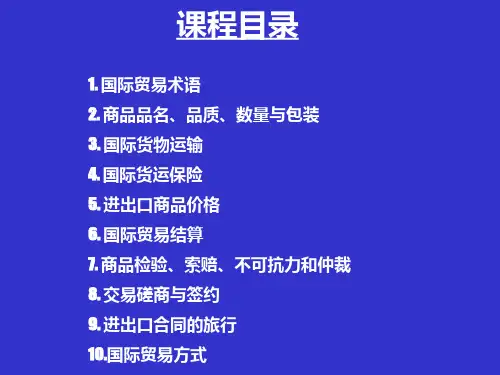
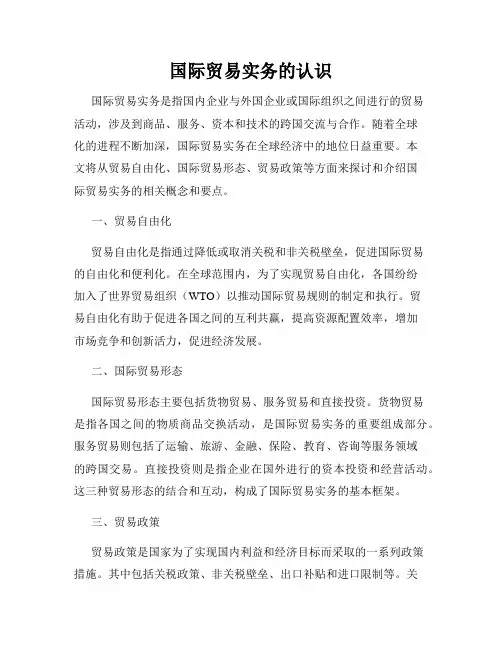
国际贸易实务的认识国际贸易实务是指国内企业与外国企业或国际组织之间进行的贸易活动,涉及到商品、服务、资本和技术的跨国交流与合作。
随着全球化的进程不断加深,国际贸易实务在全球经济中的地位日益重要。
本文将从贸易自由化、国际贸易形态、贸易政策等方面来探讨和介绍国际贸易实务的相关概念和要点。
一、贸易自由化贸易自由化是指通过降低或取消关税和非关税壁垒,促进国际贸易的自由化和便利化。
在全球范围内,为了实现贸易自由化,各国纷纷加入了世界贸易组织(WTO)以推动国际贸易规则的制定和执行。
贸易自由化有助于促进各国之间的互利共赢,提高资源配置效率,增加市场竞争和创新活力,促进经济发展。
二、国际贸易形态国际贸易形态主要包括货物贸易、服务贸易和直接投资。
货物贸易是指各国之间的物质商品交换活动,是国际贸易实务的重要组成部分。
服务贸易则包括了运输、旅游、金融、保险、教育、咨询等服务领域的跨国交易。
直接投资则是指企业在国外进行的资本投资和经营活动。
这三种贸易形态的结合和互动,构成了国际贸易实务的基本框架。
三、贸易政策贸易政策是国家为了实现国内利益和经济目标而采取的一系列政策措施。
其中包括关税政策、非关税壁垒、出口补贴和进口限制等。
关税政策是指国家对进口和出口商品征收的税费。
非关税壁垒则指的是一些非关税性质的限制和控制措施,如配额、许可证、技术壁垒等。
出口补贴是指国家对出口商品提供的各种优惠措施。
进口限制则是指国家对进口商品进行的限制和约束。
不同国家的贸易政策会对国际贸易实务产生重大影响,因此了解和研究贸易政策是进行国际贸易实务的基础。
四、国际贸易实务的意义国际贸易实务对于各个国家和企业来说都具有重要的意义。
首先,国际贸易实务有助于促进资源的优化配置,提高经济效益。
通过国际贸易,各国可以选择最具竞争力的资源和产品进行生产和消费,从而实现资源的最优配置。
其次,国际贸易实务推动了技术和理念的传播与创新。
在国际贸易中,不同国家的企业和机构之间的交流与合作可以促进技术的创新和进步。
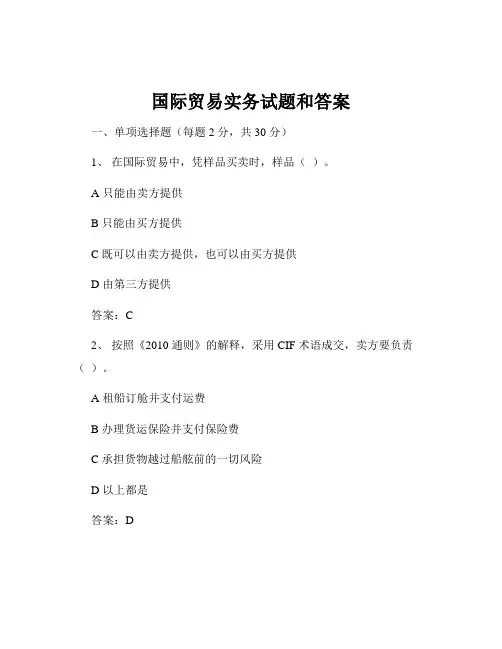
国际贸易实务试题和答案一、单项选择题(每题 2 分,共 30 分)1、在国际贸易中,凭样品买卖时,样品()。
A 只能由卖方提供B 只能由买方提供C 既可以由卖方提供,也可以由买方提供D 由第三方提供答案:C2、按照《2010 通则》的解释,采用 CIF 术语成交,卖方要负责()。
A 租船订舱并支付运费B 办理货运保险并支付保险费C 承担货物越过船舷前的一切风险D 以上都是答案:D3、某公司出口一批货物,报价为 CIF 纽约,总价为 10000 美元,其中运费为 200 美元,保险费为 100 美元。
则该批货物的 FOB 价为()美元。
A 9700B 9800C 9900D 10000答案:A解析:FOB 价= CIF 价运费保险费= 10000 200 100 = 9700(美元)4、象征性交货是指()。
A 卖方交货时无需实际交货,只需提交有关单据B 卖方交货时只需提交货物C 买方收货时无需实际收货,只需提交有关单据D 买方收货时只需提交货物答案:A5、对于品质公差范围内的货物,买方()。
A 可以拒收B 可以要求调整价格C 不得拒收D 可以要求损害赔偿答案:C6、班轮运输的运费应该()。
A 包括装卸费,但不计滞期费、速遣费B 包括装卸费,但应计滞期费、速遣费C 不包括装卸费D 不包括装卸费,也不计滞期费、速遣费答案:A7、共同海损的牺牲和费用应该由()。
A 受损方各自承担B 船方承担C 受益各方按受益大小的比例分摊D 保险公司承担答案:C8、按《跟单信用证统一惯例》规定,信用证中如果未规定是否允许分批装运和转运,则视为()。
A 允许分批装运和转运B 不允许分批装运和转运C 允许分批装运,但不允许转运D 不允许分批装运,但允许转运答案:A9、某汇票承兑日为 5 月 31 日,“见票后 90 天”付款,到期日为()。
A 8 月 28 日B 8 月 29 日C 8 月 30 日D 8 月 31 日答案:C解析:从 6 月 1 日起算 90 天,6 月 30 天,7 月 31 天,8 月 29 天,所以到期日为 8 月 30 日。

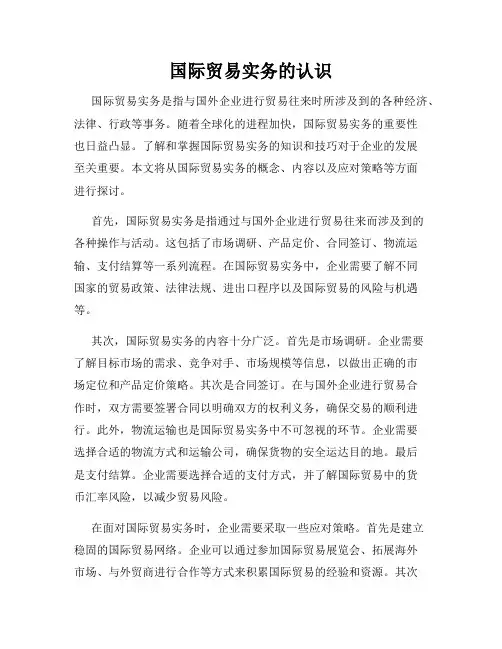
国际贸易实务的认识国际贸易实务是指与国外企业进行贸易往来时所涉及到的各种经济、法律、行政等事务。
随着全球化的进程加快,国际贸易实务的重要性也日益凸显。
了解和掌握国际贸易实务的知识和技巧对于企业的发展至关重要。
本文将从国际贸易实务的概念、内容以及应对策略等方面进行探讨。
首先,国际贸易实务是指通过与国外企业进行贸易往来而涉及到的各种操作与活动。
这包括了市场调研、产品定价、合同签订、物流运输、支付结算等一系列流程。
在国际贸易实务中,企业需要了解不同国家的贸易政策、法律法规、进出口程序以及国际贸易的风险与机遇等。
其次,国际贸易实务的内容十分广泛。
首先是市场调研。
企业需要了解目标市场的需求、竞争对手、市场规模等信息,以做出正确的市场定位和产品定价策略。
其次是合同签订。
在与国外企业进行贸易合作时,双方需要签署合同以明确双方的权利义务,确保交易的顺利进行。
此外,物流运输也是国际贸易实务中不可忽视的环节。
企业需要选择合适的物流方式和运输公司,确保货物的安全运达目的地。
最后是支付结算。
企业需要选择合适的支付方式,并了解国际贸易中的货币汇率风险,以减少贸易风险。
在面对国际贸易实务时,企业需要采取一些应对策略。
首先是建立稳固的国际贸易网络。
企业可以通过参加国际贸易展览会、拓展海外市场、与外贸商进行合作等方式来积累国际贸易的经验和资源。
其次是加强贸易合规管理。
企业需要了解并遵守各国的贸易政策和法律法规,制定合规的运营策略,以避免引发贸易纠纷或受到法律制裁。
此外,企业还可以运用信息技术手段提高国际贸易的效率和安全性,例如建立电子商务平台、使用物联网技术等。
同时,企业还应关注国际贸易实务中的风险因素。
国际贸易实务的风险包括政治风险、经济风险、商业风险等。
企业应积极应对这些风险,例如通过政府间协议降低政治风险,通过多元化市场分散经济风险,通过风险管理工具减少商业风险。
总之,国际贸易实务的认识对于企业的发展至关重要。
企业应充分了解国际贸易实务的概念与内容,并采取相应的应对策略和风险管理措施,以提高贸易效率、降低贸易风险,实现企业的可持续发展。


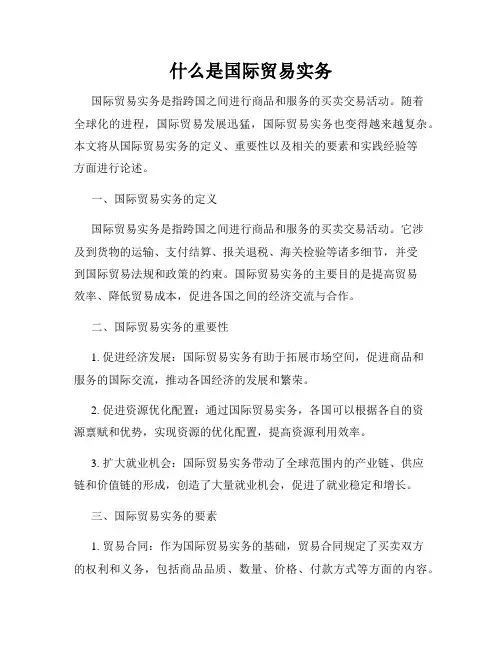
什么是国际贸易实务国际贸易实务是指跨国之间进行商品和服务的买卖交易活动。
随着全球化的进程,国际贸易发展迅猛,国际贸易实务也变得越来越复杂。
本文将从国际贸易实务的定义、重要性以及相关的要素和实践经验等方面进行论述。
一、国际贸易实务的定义国际贸易实务是指跨国之间进行商品和服务的买卖交易活动。
它涉及到货物的运输、支付结算、报关退税、海关检验等诸多细节,并受到国际贸易法规和政策的约束。
国际贸易实务的主要目的是提高贸易效率、降低贸易成本,促进各国之间的经济交流与合作。
二、国际贸易实务的重要性1. 促进经济发展:国际贸易实务有助于拓展市场空间,促进商品和服务的国际交流,推动各国经济的发展和繁荣。
2. 促进资源优化配置:通过国际贸易实务,各国可以根据各自的资源禀赋和优势,实现资源的优化配置,提高资源利用效率。
3. 扩大就业机会:国际贸易实务带动了全球范围内的产业链、供应链和价值链的形成,创造了大量就业机会,促进了就业稳定和增长。
三、国际贸易实务的要素1. 贸易合同:作为国际贸易实务的基础,贸易合同规定了买卖双方的权利和义务,包括商品品质、数量、价格、付款方式等方面的内容。
2. 关税和非关税措施:关税是国家对进口和出口商品征收的税费,非关税措施包括进口配额、技术壁垒、质量检验等,它们对国际贸易实务产生重大影响。
3. 国际支付和结算:国际贸易涉及到跨国支付和结算问题,包括信用证、托收、汇票等方式,这些支付和结算手段对贸易实务的进行起到关键作用。
4. 运输和物流:国际贸易实务需要解决货物的运输、仓储、包装和配送等问题,物流环节的顺利进行对贸易实务非常重要。
四、国际贸易实务的实践经验1. 加强市场研究和信息收集:了解国际市场的需求和竞争情况,及时准确获取相关信息,是开展国际贸易实务的基础。
2. 遵守国际贸易法规和规定:不同国家有不同的贸易法规和规定,遵循国际贸易法规是保证贸易实务顺利进行的关键。
3. 寻求贸易伙伴和建立合作关系:建立长期稳定的贸易伙伴关系有助于减少不确定性,提升贸易实务的效率和效益。
国际贸易实务是一门专门研究国际间商品交换的具体过程的学科,是一门具有涉外活动特点的实践性很强的综合性应用科学。
研究国际货物买卖的有关理论和实际业务。
国际贸易是指世界各国、各地区之间所进行的商品交换,包括服务、技术等特殊商品的交换。
二、国际货物买卖合同适用的法律1、国内法;法律冲突通常在国内法中规定冲突规范的办法,可选择一国的法律、按最密切联系的原则;2、国际贸易惯例(ITC);由国际组织将在国际贸易业务中反复实践的习惯做法,加以编纂与解释所形成的非强制性文件。
贸易惯例的性质:本身不是法律,没有普遍的强制性,只有当事人在合同中规定加以采用时,才对合同当事人有法律约束力.在合同中作了与国际贸易惯例不同的规定,以合同规定为准。
《国际贸易术语解释通则》、《跟单信用证统一惯例》、《托收统一规则》常用的三大贸易惯例3、国际条约(1)国际条约是两个或两个以上主权国家为确定彼此的政治、经济、贸易、文化、军事等方面的权利和义务而缔结的诸如公约、协定、议定书等各种协议的总称。
(2)《联合国国际货物销售合同公约》(United Nations convention on contracts for the international sales of goods 简称CISG)(3)公约分四部分:适用范围和总则;合同的订立;货物销售;最后条款共101条(4)中国关于公约提出的两项保留:公约适用范围的保留合同形式的保留(三)合同的合法性和有效性一个依法成立的合同,在当事人之间具有相当于法律的效力。
因此,只有一个合法的、有效的合同,才具有这种效力,从而对买方和卖方产生约束力。
1、合同的合法性。
对于一个合法的合同,一般应注意以下几个问题:①公共政策;②违禁品问题;③敌对国贸易问题;2、合同的有效性。
对于合同的生效要素,一般应注意以下几点:①订约人的能力:自然人(未成年人、醉酒者、精神病人无订约能力)、法人;②意思是真实的(欺诈、胁迫、错误等无效);③约因或对价;④合同的形式:我国法律规定:合同必须按规定的形式和程序成立才有效。
国际贸易实务期末重点复习资料一、国际贸易基本概念国际贸易是指各个国家之间进行的商品和服务的交流和交易活动。
它是国家之间经济联系的重要形式,也是国际经济交流的重要组成部分。
国际贸易活动的特点包括货物流动性、国际支付、国际贸易政策和国际贸易竞争等。
二、国际贸易主体国际贸易主体包括进口商、出口商和中间商。
进口商是指从其他国家购买产品的企业或个人,出口商是指销售给其他国家的产品的企业或个人,中间商是指在国际贸易中充当中介的企业或个人。
三、国际贸易方式国际贸易方式包括直接贸易和间接贸易。
直接贸易是指买卖双方直接进行产品交换,没有中间商参与;间接贸易是指通过中间商进行买卖双方之间的产品交换。
四、国际贸易支付方式国际贸易支付方式包括现金支付、信用支付和电子支付。
现金支付是指买方在收到货物后直接支付货款;信用支付是指买方和卖方之间通过信用证等付款方式进行支付;电子支付是指通过在线支付平台进行支付。
五、国际贸易制度国际贸易制度包括世贸组织(WTO)和自由贸易区等。
世贸组织是推动国际贸易自由化的重要组织,通过制定贸易规则和解决贸易争端来促进国际贸易的发展。
六、国际贸易保护主义国际贸易保护主义是指国家采取各种手段限制进口,保护本国产业的行为。
常见的贸易保护措施包括关税、配额和非关税壁垒等。
七、国际贸易政策工具国际贸易政策工具包括关税、进口配额、反倾销措施和贸易救济等。
关税是国家向进口商品征收的税款,进口配额是指限制特定商品进口数量,反倾销措施是指对倾销产品进行制裁,贸易救济是指采取临时性保护措施保护本国产业。
八、国际贸易条款国际贸易条款是买卖双方在国际贸易合同中约定的关于交货方式、付款方式、质量要求等方面的规定。
常见的国际贸易条款有FOB、CIF 和EXW等。
九、国际贸易争端解决机制国际贸易争端解决机制包括世贸组织争端解决机制和双边谈判等。
世贸组织争端解决机制是通过争端解决机构对贸易争端进行调查和裁决,实现对争端的解决。
国贸实务常见问题国际贸易实务常见问题解答国际贸易实务是一个复杂而庞杂的领域,涉及到许多不同的方面和程序。
在进行国际贸易活动时,常常会遇到各种各样的问题。
本文将就一些常见的国际贸易实务问题进行解答,希望对读者有所帮助。
1. 如何选择合适的国际贸易方式?在选择国际贸易方式时,需要考虑多种因素,如产品特点、运输成本、风险承担能力等。
一般来说,常见的国际贸易方式包括进出口贸易、外包装贸易、代理贸易等。
根据具体情况,可以选择最适合自己的贸易方式。
2. 如何确保国际贸易合同的有效性?为了确保国际贸易合同的有效性,需要注意以下几个方面:- 合同的书面形式:合同必须采用书面形式,明确约定各方的权利和义务。
- 合同的明确性:合同内容应明确无误,避免模糊和含糊不清的表达。
- 合同的合法性:合同内容和行为必须符合国家法律法规的规定。
- 合同的签署和盖章:合同必须由双方当事人签署,并盖章确认。
3. 如何应对国际贸易风险?国际贸易活动中存在着很多风险,比如货币汇率风险、政治风险、市场风险等。
为了降低风险,可以采取以下措施:- 多元化市场和客户:不要过度依赖某一个市场或客户,分散风险。
- 风险评估和管理:在进行国际贸易活动前,对相关风险进行评估,并采取相应的风险管理措施。
- 合理选择支付方式:根据实际情况选择适合的支付方式,减少货币汇率风险。
4. 如何解决国际贸易纠纷?在国际贸易活动中,难免会出现一些纠纷。
解决国际贸易纠纷的常见方式包括:- 协商解决:双方当事人可以通过友好协商解决纠纷,达成和解协议。
- 仲裁解决:双方当事人可以选择国际商会仲裁或其他专业仲裁机构来解决争议。
- 诉讼解决:如果协商和仲裁都无法解决纠纷,双方当事人可以通过诉讼途径解决争议。
5. 如何提高国际贸易操作效率?为了提高国际贸易操作效率,可以采取以下措施:- 优化流程和管理:建立高效的流程和管理机制,提高处理效率。
- 运用科技手段:利用信息化技术,提高贸易操作的自动化和数字化水平。
国际贸易实务课程内容国际贸易实务课程内容可以分为以下几个主要方面:1. 国际贸易原理:包括贸易理论、贸易政策和国际贸易制度等内容。
在这一部分,学生将了解贸易的基本概念、国际贸易的动因和利益,以及国际贸易相关的政策和规则。
2. 跨境贸易流程:探讨跨境贸易的具体流程,包括订单、发货、运输、清关、支付和结算等各个环节。
这一部分将涉及到贸易文件、运输方式、贸易术语以及相关的贸易政策和法规。
3. 国际市场准入:介绍进入国际市场的不同途径和策略。
学生将了解如何选择合适的市场、确定目标市场和消费者群体,并学习如何应对市场准入的障碍和挑战。
4. 跨文化沟通与谈判:关注在国际贸易中的跨文化交流和谈判技巧。
学生将学习如何解决文化差异带来的挑战,以及如何进行有效的谈判和协商。
5. 国际贸易法律和合同:学习国际贸易中的法律框架和合同管理。
包括了解国际贸易法律的基本原则、国际贸易纠纷解决机制以及合同的要素和执行。
6. 货物贸易和服务贸易:分别介绍货物贸易和服务贸易的特点和规则。
学生将了解货物贸易中的国际供应链管理和贸易融资,以及服务贸易中的知识产权保护和跨境服务提供。
7. 跨境电子商务:讨论电子商务在国际贸易中的应用和发展趋势。
学生将了解跨境电子商务平台、支付体系和物流网络的运作,以及电子商务的相关政策和法规。
8. 贸易风险管理:学习贸易中的风险管理和保险制度。
学生将了解国际贸易中的风险类型,如物流风险和金融风险,以及贸易风险管理和保险的工具和策略。
在这些内容的学习和讨论过程中,可以通过案例分析和实际项目来加深对实务问题的理解和应用能力。
另外,还可以进行实地考察、企业讲座和模拟贸易谈判等实践活动,以提升学生的实际操作能力和解决问题的能力。
总之,国际贸易实务课程内容涵盖了从理论到实践的全过程,旨在培养学生全面了解和应对国际贸易的能力。
国际贸易实务知识点总结1. 国际贸易概述1.1 定义:国际贸易是指不同国家和地区之间进行的商品和服务交换。
1.2 目的:促进资源的最优配置,实现比较优势,提高生产效率。
1.3 类型:包括货物贸易、服务贸易、技术贸易等。
2. 国际贸易理论2.1 经典理论:亚当·斯密的《国富论》提出绝对优势理论,大卫·李嘉图的《政治经济学及赋税原理》提出比较优势理论。
2.2 新贸易理论:强调规模经济、产品差异化和市场不完全竞争。
2.3 国际分工:随着全球化的发展,国际分工越来越细化。
3. 国际贸易政策3.1 贸易壁垒:包括关税壁垒、非关税壁垒(如配额、许可证制度)。
3.2 贸易协定:如世界贸易组织(WTO)、自由贸易协定(FTA)、经济合作协定(EPA)等。
3.3 出口鼓励政策:出口补贴、出口信贷、出口退税等。
4. 国际贸易操作流程4.1 市场调研:了解目标市场的需求、竞争状况、法律法规等。
4.2 交易磋商:询盘、报盘、还盘、接受等环节。
4.3 合同签订:明确货物描述、价格条款、交货条件、支付方式等。
4.4 履约操作:生产备货、装运、保险、支付等。
5. 国际贸易术语5.1 国际贸易术语解释通则(Incoterms):如FOB(船上交货)、CIF(成本加保险费加运费)等。
5.2 风险与责任划分:根据Incoterms的规定,明确买卖双方的风险与责任转移点。
6. 国际支付方式6.1 汇付:电汇、信汇等。
6.2 托收:付款交单(D/P)、承兑交单(D/A)等。
6.3 信用证(L/C):最为常见的国际贸易支付方式,包括即期信用证、远期信用证等。
7. 国际货物运输7.1 运输方式:海运、空运、陆运、多式联运等。
7.2 运输单据:提单(Bill of Lading)、空运单(Air Waybill)等。
7.3 运输保险:海洋货物运输保险、航空运输保险等。
8. 国际贸易风险管理8.1 信用风险:通过信用证等支付方式来降低。
国际贸易实务知识国际贸易是指不同国家或地区之间通过买卖货物、提供服务和资本流动等方式进行的经济交流活动。
在全球化时代,了解国际贸易实务知识对于企业和个人来说至关重要。
1. 国际贸易基础知识了解国际贸易的基础知识是开始的第一步。
以下是一些常见的概念:•出口与进口:出口是指从一个国家或地区向其他国家或地区销售商品或服务,进口则相反。
•贸易平衡与逆差:当一个国家的出口和进口总额相等时,称为贸易平衡;当一个国家的进口大于出口时,称为贸易逆差。
•关税与非关税壁垒:关税是政府对进口商品征收的税费,非关税壁垒包括配额限制、技术标准等各种措施。
2. 国际贸易组织和协议了解国际贸易组织和协议有助于更好地理解和参与国际贸易活动。
以下是一些常见的组织和协议:•世界贸易组织(WTO):是国际贸易领域的主要组织,致力于促进自由贸易和公平竞争。
•自由贸易协定:各国之间签署的协议,以减少关税和非关税壁垒,提升贸易便利性。
•区域经济一体化组织:例如欧盟、东盟等,通过更紧密的经济联系来促进成员国之间的贸易。
3. 国际贸易支付方式在进行国际贸易时,了解不同的支付方式对企业和个人来说至关重要。
以下是一些常见的支付方式:•信用证:银行为买方开立的信用证,保证了卖方收到款项。
•托收:指将产权交付给银行,并委托其按照买卖双方约定收取货款。
•跨境电子支付:通过在线支付平台(如PayPal)进行跨境交易。
4. 进出口合规与文档要求在进行国际贸易时,合规性和正确填写相关文件是至关重要的。
以下是一些注意事项:•海关报关单和其他必需文件:根据目的地国家或地区的法规要求填写相应文件。
•贸易合规要求:了解货物的进出口许可、标准和规范。
5. 地区特定的国际贸易问题不同地区有其特定的国际贸易问题,需要了解相关情况以更好地进行商业活动。
•欧洲经济区(EEA)和欧盟内部贸易:了解欧盟内部的自由贸易和相关法规。
•中国对外贸易政策:了解中国的进出口政策、海关要求等。
国际贸易实务(英文版) International Trade PracticeChapter one1 Why do nations conduct trade with one another?答:A nation conducts international trade because:it has the products and resources that exceed its domestic demand;it wants to get more economic benefits in a larger international market than what can be gained in domestic market;it wants to win political support;or it needs to satisfy different tastes,preferences and consumption patterns among its people.2 How many forms are adopted in the process of negotiation?Business negotiations can be conducted in two forms:in words,i.e. face-to-face negotiation or negotiation through telephone,and in writing,i.e. business correspondence which includes letters,faxes,e-mails,telexes,etc. Whatever is chosen for the negotiation of a contract,four main steps are generally followed before a contract is concluded:enquiry,offer,counter-offer and acceptance.Chapter twoIII Explain the following terms1 shipment contract答:Shipment contract is a contract using an Incoterm which indicates that the delivery happens at the time or before the time ofshipment.2 symbolic deliverySymbolic delivery is a delivery situation in which when the seller delivers the buyer does not physically receive the goods. This kind of delivery is proved by the submission of transport document by the seller to the buyer.3 arrival contractArrival contract means a contract using an Incoterm which indicates that the delivery happens when the goods arrive at the destination.4 actual deliveryActual delivery refers to a delivery situation in which when the seller delivers the buyer does physically receive the goods.IV. Short questions1 What are the two types of trade terms concerning the transfer of risks?答:Shipment contract terms vs. arrival contract terms. Under shipment contract terms seller’s risk will be transferred to the buyer before the goods depart from the place/port of shipment. Under arrival contract terms seller will bear the risk of the goods until the goods arrive the destination.2 What are the differences and similarities between CIP and CIF? 答:Major similarities: a. seller should contract and pay for the major carriage. b. Seller is not taking the risk of loss or damage to the goods during the transportation. c. Seller must obtain insurance against buyer’s risk. Difference: a. CPT is applicabl e to any kind of transportation mode while CFR is only used for waterway transport.b. Under CPT seller’s risk will be transferred to the buyer when the goods are handed over to the first carrier nominated by seller. Under CFR seller’s risk will be transfe rred when the goods pass over the ship’s rail.3 Who is responsible for carrying out customs formalities for exports under an FOB contract?答:Seller. According to Incoterms 2000, except EXW and DDP these two terms, all the other eleven terms require the seller to handle the export customs formalities, while buyer the import customs formalities.4 If a Chinese trader signs a FOB Hamburg contract, is he exporting or importing?答:Importing. FOB should be used with a “named port of shipment”,if Hamburg is the port of shipment, from the Chinese trader’s perspective, he is importing.V.Case Studies1. (变形) An FOB contract stipulated, "The shipment will be effected in March2008. If the vessel fails to arrive at the port of shipment on time, the seller agrees to set aside the goods for additional 27 days, and the buyer will bear all costs of delay." it turned out that under the seller's repeated requests, the vessel named by the buyer finally arrived at the port of shipment on May 1. As a result, the seller refused to make the shipment.(1)Was the seller entitled to compensation for the warehouse rent, insurance andinterest due to the delay?(2)If the seller had sold the goods to a third party on April 25, should the buyerpay for the delay?(3)If the seller had sold the goods to a third party on May 1 with a better price,was he entitled to any compensation?析:a案例中提到“shipment will be effected in March 2008”,这种确定装运时间的方式允许在整个3月份期间的任何时间进行装运。
也即是说,装运的最后期限为08年3月31日。
b文中提到的“additional 27 days”,根据合同卖方同意在买方船期延误的情况下为其将货物保留到4月27日。
(1)答案:Yes。
答题切入点:a FOB术语关于双方费用划分的规定;b 合同本身的条款规定。
(2)答案:No。
答题切入点:合同本身的条款规定。
(3)这题与第一题相比,不同的一点在于“with a better price”。
解答时应对这一点进行分析:在卖方卖出货物获得更高利润的情况下,他是否还应获得相关赔偿?答案:Yes。
答题切入点:合同本身的条款规定。
4. (日期变形)A Shanghai company signed a CIF contract to sell Christmas goods to a British company. The $1 million contract stipulated, "The seller guarantees that the goods arrive at the port of destination by December 1, 2008. If the carriage is late,the buyer can cancel the purchase, and get the refund for the payment." So the shipment was made. Unfortunately, due to mechanical problems, the vessel arrived at the destination a few hours late. The buyer refused to accept the goods. As a result, the goods had to be sold on the spot, and the seller lost $700,000.(1)Was the "arrival date" clause consistent with CIF term under Incoterms2000?(2)What trade term is proper for the obligation concerning arrival time?析:卖方受损的原因是货物达到目的港的时间晚于合同规定的时间,因此买方拒收货物。